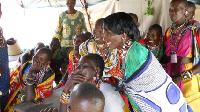 Our classes are interdisciplinary in nature and provide information applicable to many career paths. We still have some room in: Applied Anthropology, Legal Anthropology, Medical Anthropology and North American Indians.
Our classes are interdisciplinary in nature and provide information applicable to many career paths. We still have some room in: Applied Anthropology, Legal Anthropology, Medical Anthropology and North American Indians. Our classes are interdisciplinary in nature and provide information applicable to many career paths. We still have some room in: Applied Anthropology, Legal Anthropology, Medical Anthropology and North American Indians.
Our classes are interdisciplinary in nature and provide information applicable to many career paths. We still have some room in: Applied Anthropology, Legal Anthropology, Medical Anthropology and North American Indians.
Picture right: Maasai women participating in a TRADE community health workshop http://www.tradenonprofit.org/
Applied Anthropology ANTH 37000 (CRN 43013):
A primary concern of Applied Anthropology will be to look critically at ways that international development programming is conceived, prioritized and funded, and ways that development programs are operationalized as projects. We will also look at community capacity building in areas such as health care, nutrition, economic empowerment, environmental justice, as well as strategies for cultural and community activism. Central to applied anthropology is participatory action research, which seeks to assist people in defining and taking ownership of their problems and the solutions to those problems. Many of the issues that we look at are directly related to environmental issues and we will develop a good understanding of political ecology. We will also examine qualitative methods that are used in these areas, and do hands on projects to become familiar with some of the methods and to learn about the complexity of some of the areas we study through first hand experience.
Legal Anthropology ANTH 39012 (CRN 43392):
This seminar provides an introduction to the field of legal anthropology. We will think critically about scholarship on the nature of the law in both cross-cultural and transnational perspectives. Course readings briefly address classic texts in the field of legal anthropology and focus heavily in a range of contemporary issues in the field of law and culture, such as the challenge of legal pluralism to international courts. The goal of the course is to engage students in critical legal debates and to expose students to the ways that law and culture scholarship is being influenced by the globalization of legal and political institutions.
Medical Anthropology ANTH 48000 (CRN 43016):
This course explores healing traditions, beliefs, and practices from around the globe. Healing modalities based in the scientific tradition, namely biomedicine, are examined and contrasted with other traditions based on cultural conceptions of balance and interconnection, such as Chinese medicine, African American health and healing, Haitian Vodou, Latin American ethnomedicines, and Holistic or Alternative healing in the U.S. Theoretical perspectives in medical anthropology are discussed and symbolic perspectives on health, gender, the body, and spiritual healing are examined cross-culturally. This analysis is coupled with an in-depth look at delivering health care in culturally pluralistic settings and how health care professionals in this country can develop a greater sensitivity to the issues involved in multicultural health care (for example, what happens when a Navajo patient summons a medicine man to the hospital?). Another significant area of medical anthropology covered in this class is applied anthropology, or how medical anthropologists work on multi-disciplinary teams (especially in the context of international health) to find solutions to pressing human problems such as HIV/AIDS, infectious diseases, chronic diseases, and the insalubrious effects of industrialization in developed and developing countries.
North American Indians ANTH 27000 (CRN 42626):
This course introduces the Native American experience within the United States. To understand the experiences of contemporary Native Americans we will explore: Native American thinking and ways of knowing, history from pre-contact to post-contact, relationships with anthropologists and science, and issues within education. Also, discussions of the current issues in the lives of Native Americans will include issues of: media and popular culture, identity, language, land claims, mascots, etc. The focus of this course is not a superficial look at the customs and traits of the various tribes, but an understanding of the complexities of the issues and struggles of contemporary Native Americans.
https://www.ithaca.edu/intercom/article.php/2012121210250039